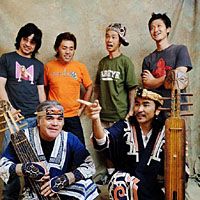Like many aspects of Ainu culture, the music of Hokkaido's indigenous people is distinct from that of the rest of Japan.
The tonkori, a large, five-stringed zither originating from Sakhalin Island, is such an example. Oki, a tonkori musician born to a Japanese mother and Ainu father, starts his nationwide tour from Jan. 19 in Kyoto.
While the BBC's description of Oki's music seems wide of the mark ("T. Rex meets Horace Andy and Can in Hawaii"), there's no doubting that Oki is one of the tonkori's most prominent worldwide practitioners. He's performed at the WOMAD festivals in Reading, England, and, in participating in the United Nations' Working Group on Indigenous Populations, has developed a network with other indigenous artists.
Oki Dub Ainu Band is on tour to promote their eponymously titled album which came out last month. The album blends Oki's Ainu roots with contemporary electronic sounds and African, dub and reggae rhythms.
Arguably, though, it's in their live incarnation that the Oki Dub Ainu Band are at their best. The two principal forms of Ainu song are upopo (festival songs) and rimse (group dance songs), and it is the lively chants of the former that Oki Dub Ainu Band mainly perform on stage.
The Oki Dub Ainu Band tour starts Jan. 19 at Metro in Kyoto before playing Okayama (Jan. 20), Osaka (21), Nagoya (22), Shibuya Apple Store (25), Daikanyama Unit (26), Sapporo (28) and Asahikawa City (Jan. 30). Ticket prices vary. For more information, visit www.tonkori.com
















With your current subscription plan you can comment on stories. However, before writing your first comment, please create a display name in the Profile section of your subscriber account page.